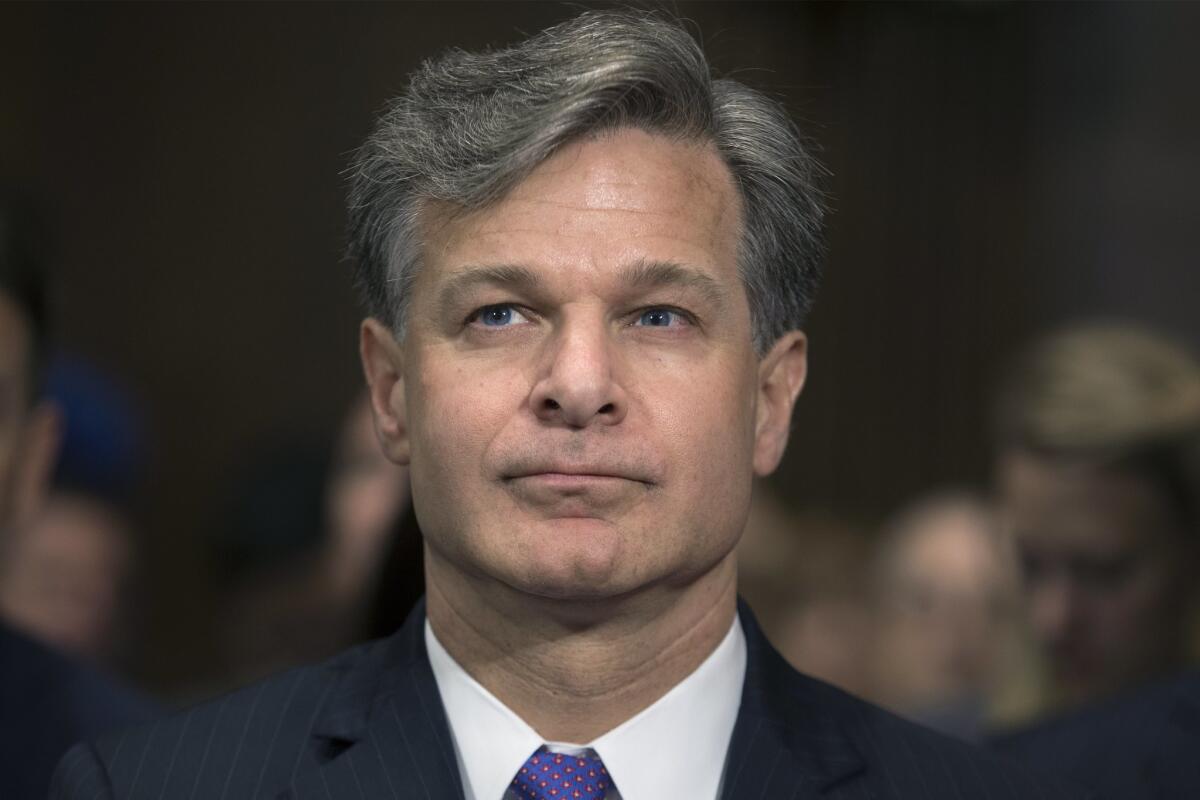Watchdog finds new problems with FBI wiretap applications

- Share via
WASHINGTON — The FBI has failed to follow its own policies for ensuring the accuracy of applications it submits to conduct wiretaps in national security investigations, including in some cases by not having documentation to support arguments made to judges, according to a letter released Tuesday.
The findings are on top of problems identified last year by the inspector general’s office, which concluded that FBI agents had made significant errors and omissions in applications to eavesdrop on a former advisor to President Trump’s 2016 campaign during the early months of the Russia investigation. Those mistakes prompted internal changes within the FBI and spurred a congressional debate over whether the bureau’s surveillance tools should be reined in.
After the Russia report was submitted last December, Inspector General Michael Horowitz announced a broader review of the FBI’s spy powers and its applications before the secretive Foreign Intelligence Surveillance Court. As part of that review, the watchdog office examined how well the FBI was complying with internal rules that require agents to submit supporting documentation to back up every factual assertion they make in the application.
Those rules, known as the Woods Procedures, were developed in 2001 after mistakes were identified in multiple applications, known by the acronym FISA, that were submitted in counterterrorism investigations.
Horowitz said in a letter to FBI Director Christopher A. Wray that in four of the 29 FISA applications his office selected for review, the FBI could not produce any supporting documents or records. In the 25 applications that were supplemented with supporting documentation, the office “identified apparent errors or inadequately supported facts in all” of them.
In some instances, facts stated in the applications were not supported by any documentation, and in others were either not corroborated by the documentation or even inconsistent with it. The watchdog office found an average of about 20 issues per application it reviewed.
As a result, Horowitz wrote, “we do not have confidence that the FBI has executed its Woods Procedures in compliance with FBI policy, or that the process is working as it was intended to help achieve the ‘scrupulously accurate’ standard for FISA applications.”
The inspector general’s office did not make a judgment as to whether the mistakes that it identified in each case were “material” to the investigation or to the court’s decision to authorize the wiretap.
The office recommended that the FBI “perform a physical inventory” to ensure that supporting documentation, known as Woods Files, exists for every application submitted to the court in all pending investigations. It also recommended that the FBI examine the results of “past and future accuracy reviews” so that it can identify trends and patterns and develop better training for agents.
In a response letter, FBI Associate Deputy Director Paul Abbate said the FBI was working to address the inspector general’s concerns and agreed with the office’s recommendations. He said the errors identified by the inspector general will be addressed by the more than 40 corrective actions that Wray ordered last year in the aftermath of the Russia investigation report.
“As Director Wray has stressed, FISA is an indispensable tool to guard against national security threats, but we must ensure that these authorities are carefully exercised and that FISA applications are scrupulously accurate,” Abbate wrote.
The Foreign Intelligence Surveillance Court was established in 1978 to handle applications from the FBI to eavesdrop on people it suspects of being agents of a foreign power, such as potential spies or terrorists. Critics have long complained about the opaque, one-sided nature of the application process, and longstanding calls to overhaul the system received a bipartisan push because of the errors identified during the FBI’s investigation into ties between the Trump campaign and Russia.
The congressional debate tripped up FBI efforts to renew three surveillance provisions that expired this month. Though the House passed Justice Department-backed legislation to address some of the civil liberties concerns identified by the inspector general, the Senate adjourned last week without approving the bill.
More to Read
Get the L.A. Times Politics newsletter
Deeply reported insights into legislation, politics and policy from Sacramento, Washington and beyond. In your inbox twice per week.
You may occasionally receive promotional content from the Los Angeles Times.










